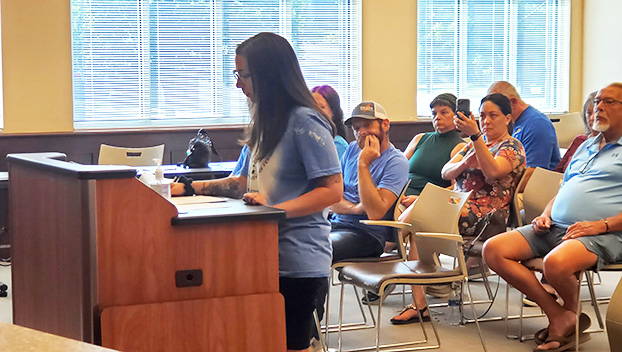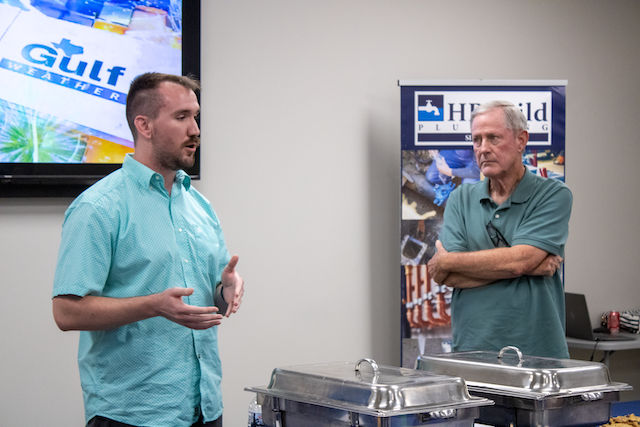GUEST COLUMN — Unintended consequences come with community cat feeding bans
Published 12:18 am Tuesday, August 8, 2023

- Vyki Derrick, president of the nonprofit Friends of Ferals, addresses Port Neches City Council in July. (Mary Meaux/The News)
|
Getting your Trinity Audio player ready...
|
Community dynamics can sometimes present us with unexpected challenges that require a broader perspective and deeper understanding.
In Port Neches, one such issue we are currently grappling with is the management of community cats, prompted by a recent, swiftly enforced ban on feeding these feral felines.
In our city, marked by its strong community spirit, the quick implementation of this ban, devoid of extensive community dialogue, has the potential for an unsettling impact. Both the feline and human residents of our city are directly affected by this ordinance, and the potential consequences are worth our collective attention.
Without a thorough understanding and a well-considered approach, abrupt changes like this feeding ban can lead to increased nuisance complaints instead of resolving them. Community cats, suddenly devoid of their food sources, may resort to increased roaming in residential areas, seeking food and shelter.
Consequently, this can result in more frequent encounters with these cats, which can exacerbate tensions and complaints within the community.
An immediate ban on feeding community cats, without a carefully planned transition phase, brings undue distress to these animals and their human caregivers. However, a larger concern exists: the well-being and management of the community cats, given the limited resources in our city shelter.
An influx of displaced cats could result in troubling options such as mass euthanasia or costly and disruptive relocations.
It is important to note that such removal efforts could inadvertently trigger a biological phenomenon known as the vacuum effect. When a portion of the animal population is permanently removed from a location, other members of the same species from neighboring areas are attracted to the vacated, resource-rich territory, moving in and reproducing at a higher rate.
This outcome can exacerbate the very overpopulation issue that the feeding ban aims to resolve. In fact, this approach might not only fail to solve the initial problem but could also lead to increased expenses in the long run, owing to repeated rounds of population control efforts.
An alternate and compassionate solution is the continued support of Trap-Neuter-Return (TNR) programs. Ample research suggests that these programs are not just cost-effective but also efficient in managing feral cat populations.
TNR improves the lives of these cats by eliminating the constant stress of mating and pregnancy, reducing nuisance behaviors such as spraying, roaming, fighting, and yowling. Furthermore, community cats contribute to the ecosystem by naturally controlling the populations of pests such as rats, mice, and snakes.
Another essential aspect of managing community cats is the placement of feeding and lounging stations, strategically positioned out of public view. These stations, maintained by volunteers, help create a safer and more organized environment for both the cats and the community.
Our local non-profit organization, Friends of Ferals, stands ready to facilitate and maintain these initiatives. Over the past year, the organization has raised approximately $30,000 through fundraising efforts.
These funds have been used to support TNR initiatives, care and rehabilitation of homeless cats, veterinary care, and procurement of essential supplies — all at no cost to the city or taxpayers.
However, despite these benefits and the willingness of Friends of Ferals to continue this work, these suggestions for a compassionate, long-term solution seem to have been sidelined.
It’s crucial to understand that when policies are implemented without diverse input, they may fall short in meeting the community’s needs or expectations.
As residents of Port Neches, we have the opportunity to actively participate in the reconsideration of the feeding ban. The way forward lies in an open dialogue inclusive of all stakeholders.
Such conversations can lead to well-informed decisions that take into account the rights and welfare of the feral cats, their caregivers, and the community as a whole. Through collaboration and understanding, we can ensure a harmonious coexistence between the residents of Port Neches and our community cats.
This balanced approach leads us towards a future that is compassionate, cost-effective and beneficial for all.
Vyki Derrick is the president of Friends of Ferals. She can be reached at friendsofferalstx@gmail.com.






